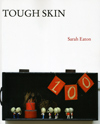Tough Skin
Sarah Eaton’s Tough Skin is a fun, scary book of prose-y poetry. Most people would probably agree that “scary” is an unusual quality to find in poetry. I can explain, I promise. While a lack of attachment to extended narrative prohibits the contemporary poem from creating the aspects of story necessary to truly feel fear – empathize-able characters, anticipation/suspense, etc. – Eaton’s poems make gestures toward horror in narrative microbursts. Think of the campy, shrewdly written episodes of Alfred Hitchcock Presents, which don’t give the viewer time to truly care whether the main character is murdered, but give pleasure of fright in their 30-minute mime shows of horror-film dialogue, melodrama and plot twists.
Sarah Eaton’s Tough Skin is a fun, scary book of prose-y poetry. Most people would probably agree that “scary” is an unusual quality to find in poetry. I can explain, I promise. While a lack of attachment to extended narrative prohibits the contemporary poem from creating the aspects of story necessary to truly feel fear – empathize-able characters, anticipation/suspense, etc. – Eaton’s poems make gestures toward horror in narrative microbursts. Think of the campy, shrewdly written episodes of Alfred Hitchcock Presents, which don’t give the viewer time to truly care whether the main character is murdered, but give pleasure of fright in their 30-minute mime shows of horror-film dialogue, melodrama and plot twists.
As Hitchcock – or rather, his writers and directors – used the most adaptable elements of film to create his television series, Eaton focuses especially on two aspects of horror fiction to create her frightening verse: grotesque imagery and its accompanying humor. In this book’s best moments, the reader feels at once gut-shot and amused.
Her love for the amusingly grotesque is evident from the long (again, amusingly so) title of the first section’s first subsection, “The time-traveling inventor alternately contemplates suicide and torture while his blood baby slumps unattractively.” In the same moment that the reader registers the horrifying thought that a man is caring for a miscarried child, he or she laughs at the prospect of thinking of a miscarriage as a being whose attractiveness can be scaled.
Hopefully, you’ll forgive me for explaining the joke, like some condescending movie date, but this title functions as a microcosm of Eaton’s book. Within it, as stated, the most obvious elements are the vivid imagery and humor, but there is more. There is empathy for a man who wishes to care for his child – who he names “Peaches” – stillborn or otherwise. The instinct to laugh at content too terrible to embrace can only carry a poem so far. Eaton allows her poems’ speakers to make observations, requests, even pleas, of various measures of gravity. Ultimately, it is this third element that makes the book work.
Take these stanzas from the poem, “It’s almost like I invented love,” still in the time-travelling inventor sequence:
Did you know that I invented the wedding ring? Without it: rampant sexual collision. Also spoons with jagged edges for eating grapefruit.
If I hadn’t invented the intercom and the binoculars, I could have slipped away so easily. If I hadn’t invented the elixir against scarlet fever. If I had invented disappearing without death. …
I can’t stop, Peaches. Dead or alive, your pulpy familiarity rests comfortably as my tongue’s target. Dead or alive, there is not much difference between what once was and what is.
Perhaps I am a sentimental being after all.
What I claim as my invention: You. Me.
Tough Skin is also highly dependent on form. The book is divided into three sections, two of which are divided into multiple subsections. The titular second section of the book looks the most like a traditional book of poems, with one line-broken lyric poem per page and no subsections. The poems comprising the sections which bookend “Tough Skin” are prose-poems and grouped in miniature, three-to-ten-poem subsections. Each section, in its own way, focuses intensely on the body, often in sexual or medical contexts.
Eaton demonstrates herself to be just as adept in the lyric as the prose-poem (which not all prose-poets can). In fact, the poems in “Tough Skin” are perhaps more bizarre than the time-travelling “What I Claim as my Invention” and “Rattlesnake on the bed,” which dedicates a section to each of three archetype characters, “The Midwife,” “The Candystriper” and “The Chaperone.” The lyrics in “Tough Skin” make more use of juxtaposition and truly strange imagery.
In “A perfect man,” Eaton writes, “Your drunken uncle likes to make macramé / owls and then shove planters in their mouths. / My drunken uncle likes to make / sweet love and then fall asleep.” In these poems, we see the traditional you/I construct of the lyric, but with youthfully sardonic wit, and a sense for the semi-surreal.
Tough Skin is a highly enjoyable read, full of lingual surprises and knockout lines, which are likely to elicit physical responses from their reader.





